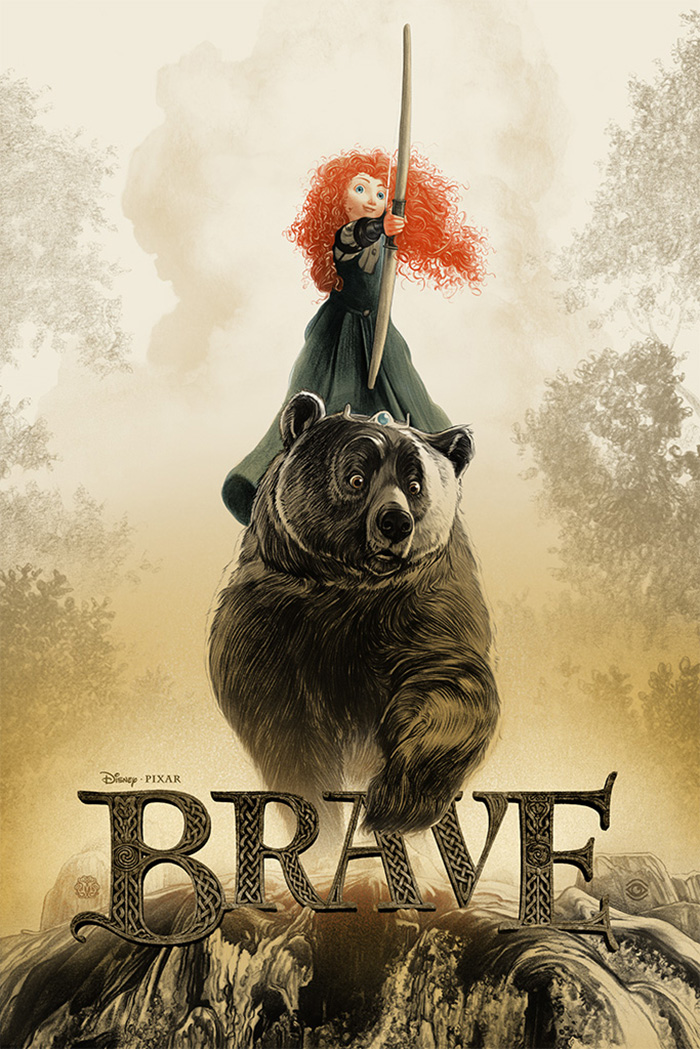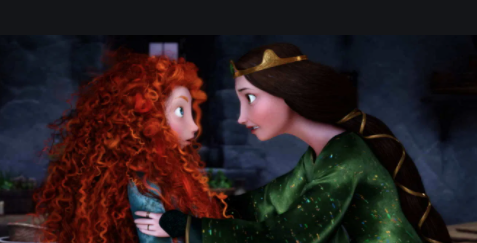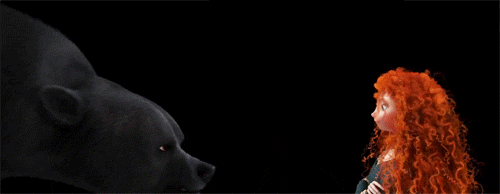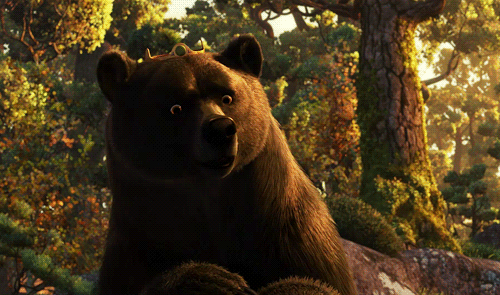 alternate poster by Greg Ruthby Eurocheese
alternate poster by Greg Ruthby Eurocheese
Pixar managed to sneak a film about motherhood into their canon by disguising it as their princess movie, and I have always wondered if that’s part of the reason it doesn’t get its due when we are discussing Pixar’s best films. Merida, our frizzy-haired princess, is nothing like her Disney counterparts. She takes after her father, a fun-loving, loud mouthed ruffian who loves his exaggerated stories. Merida wants a world of adventure, and she despises being held back from it because of her gender.
This leads to inevitable conflict with her mother Elinor, a queen saddled with a boisterous husband, a rebellious daughter and triplets that spend the entire film causing havoc. Let’s be honest – this could easily have been the stock mother character, side-eyeing all the shenanigans and cleaning up everyone’s messes. Elinor is smarter than that, though...

She has figured out that when a room full of overgrown man-boys goes wild, she can step in with authority and draw the line of what she finds acceptable. She also knows something Merida doesn’t – in their world, this is her saving grace. This is her voice, and it is the one thing she seems desperate to instill in her daughter before time has run out. Unfortunately, the way in which she does this is to try to mold Merida into someone like herself, because she understands the strength of her own position. She doesn’t care that Merida tears through the woods in her free time, shooting off arrows and embracing her wild nature. She instead fears Merida’s lack of control, and like many parents who struggle with their teenage children, she resorts to alienating her daughter when trying to help her find the right path.
Merida is unaware of this, confused why her loving mother is insistent on such silly gender-based traditions. In a dramatic fight (and perhaps with too obvious symbolism), their family tapestry is torn, showing their separation, and Merida’s bow is nearly burnt in the fire. At her breaking point, Merida seeks a solution – she has to change her mother’s mind. This leads to an uncomfortable sequence where she seeks a redeeming potion to cure all her woes from a questionable witch in the forest. Without a second thought, she returns to douse her mother. For a brief moment, there is a fear in the audience that she has poisoned her mother (a far cry from any other Disney princess movie we’d ever seen). Instead, we see Elinor transform into a bear, throwing the movie into chaos.
As it turns out – and lucky for Merida, who could have destroyed her family and her future – the witch had her best interest at heart. Forced to work together, the grief-stricken, confused Elinor and shocked but resourceful Merida have to make their way out of a castle full of warriors. A favorite moment of the script I’d forgotten before rewatching for this write up is that the triplets, at first seemingly scared by the shadow of a bear, quickly fall into line when the bear begins to order them around as their mother. Elinor still maintains her authority and demands respect, no matter what shape she takes.

Mother and daughter escape to the woods and begin working on their next moves. Elinor is forced out of her comfort zone and lands in Merida’s world, where skills her daughter has acquired are no longer pesky distractions, but essential strengths. We not only see Elinor learn to adapt, to fish, and even to trust her daughter (a difficult task, given what had just happened) – we start to see her realize the woman Merida is becoming. Merida was never going to grow up to be Elinor. By throwing their lives into chaos, Merida accidentally achieved her goal – her mother can see her point of view.
After failing to find the witch and encountering a snarling bear villain that is sure to return, the pair return to the castle, looking to mend their torn tapestry. In my favorite scene of the film, Elinor the bear is attempting to sneak across a room full of men who would love to attack any animal in sight, and Merida finds herself needing to command the room’s attention. Perhaps for the first time in the film, she has no idea what to do, and we see her turn to her mother for help. This is everything Elinor has wanted: she can choose to force Merida in this moment to bow to her wishes, to marry and to become like her, if that’s her desire. Instead, in a beautiful twist, we see her teaching her daughter to find the words that reflect her own heart, showing her how to powerfully use her own voice. In a single decision, Elinor gives her daughter the strength she will need moving forward, casting aside visions of what she “should be” and embracing her as her own person.
From there, the adventure continues and as we might have guessed, the climactic moments involve Merida protecting her mother’s bear from the warriors, and the return of the villainous bear. It will not be Merida’s bear-slaying father who will save her though, as much as he tries; it will be her mother, literally out of her own skin, out of her depth and still throwing everything she has in harm’s way to protect her daughter. The villain is conquered, Elinor returns to human form and all is well. As Merida declares her independence and steps into her own power, it is with her mother’s admiration. The two women will never be the same, but they have found a love to bridge the gap between them.

So here’s to the moms who demanded the best from their children, helped them find their own voice and would stand in the way of a rampaging bear to save them. We wouldn’t be the same without you. Happy Mother’s Day!